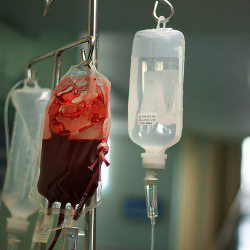This Week in PLOS Medicine: Quality of life with kidney disease; Spin of RCTs; Aid for blood transfusions
This week PLOS Medicine publishes three new articles:
Melanie Wyld and colleagues examined the utility-based quality of life of various treatments for late-stage chronic kidney disease and report that the highest utility was for kidney transplants, while home-based automated peritoneal dialysis was superior to continuous ambulatory peritoneal dialysis.
A study conducted by Amélie Yavchitz and colleagues examines the factors associated with “spin” (specific reporting strategies, intentional or unintentional, that emphasize the beneficial effect of treatments) in press releases of clinical trials.
Jean-Pierre Allain and colleagues argue that, while unintended, the foreign aid provided for blood transfusion services in sub-Saharan Africa has resulted in serious negative consequences that require reflection and rethinking.
Remember you can comment on, annotate and rate any PLOS Medicine article and see the views, citations and other indications of impact of an article on that articles metrics tab.

